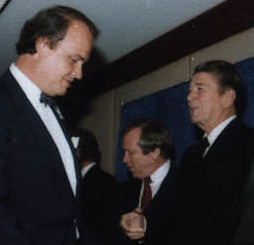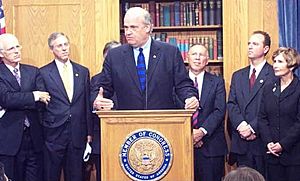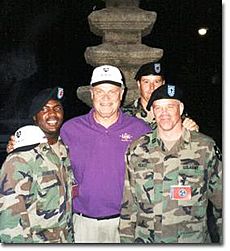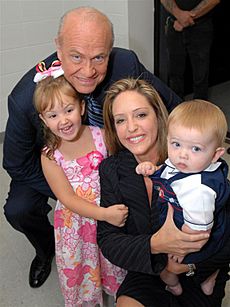Fred Thompson facts for kids
Quick facts for kids
Fred Thompson
|
|
|---|---|
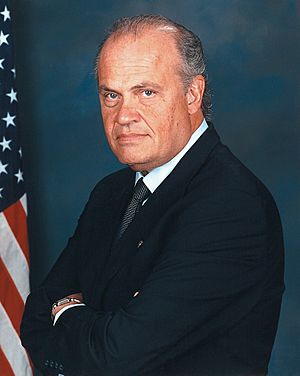 |
|
| United States Senator from Tennessee |
|
| In office December 2, 1994 – January 3, 2003 |
|
| Preceded by | Harlan Mathews |
| Succeeded by | Lamar Alexander |
| Chair of the Senate Governmental Affairs Committee | |
| In office January 20, 2001 – June 6, 2001 |
|
| Preceded by | Joe Lieberman |
| Succeeded by | Joe Lieberman |
| In office January 3, 1997 – January 3, 2001 |
|
| Preceded by | Ted Stevens |
| Succeeded by | Joe Lieberman |
| Personal details | |
| Born |
Freddie Dalton Thompson
August 19, 1942 Sheffield, Alabama, U.S. |
| Died | November 1, 2015 (aged 73) Nashville, Tennessee, U.S. |
| Political party | Republican |
| Spouses |
Sarah Knestrick
(m. 1959; div. 1985)Jeri Kehn
(m. 2002) |
| Children | 5 |
| Education | University of Memphis (BA) Vanderbilt University (JD) |
| Signature |  |
Freddie Dalton Thompson (born August 19, 1942 – died November 1, 2015) was an American politician, lawyer, and actor. He was a member of the Republican Party. He served as a United States Senator for Tennessee from 1994 to 2003. Thompson also tried to become president in 2008 but was not successful.
He was also involved in national security and intelligence. He chaired an advisory board for the U.S. Department of State. He was also a member of the Council on Foreign Relations.
As an actor, known as Fred Dalton Thompson, he appeared in many movies and TV shows. These included Matlock, The Hunt for Red October, and Law & Order. He often played government officials or military characters.
Contents
- Growing Up and Education
- Fred Thompson's Law Career
- Working as a Lobbyist
- Starting His Acting Career
- Serving in the United States Senate
- Life After the Senate
- 2008 Presidential Campaign
- After the Presidential Campaign
- Fred Thompson's Political Views
- Film and Television Roles
- Book Written by Fred Thompson
- Election Results
- See also
Growing Up and Education
Thompson was born in Sheffield, Alabama, on August 19, 1942. His parents were Ruth Inez Bradley and Fletcher Session Thompson, who sold cars. Fred grew up in Lawrenceburg, Tennessee. He graduated from Lawrence County High School in 1960. After high school, he worked at the local post office and a bicycle factory.
He was raised in the Churches of Christ. Thompson said his values came from his family and his church. He attended church when he was in Tennessee.
In September 1959, at age 17, Thompson married Sarah Elizabeth Lindsey. They had three children: Freddie Dalton "Tony" Thompson Jr., Daniel, and Elizabeth.
Thompson was the first in his family to go to college. He attended Florence State College (now the University of North Alabama). He then went to Memphis State University (now the University of Memphis). There, he earned degrees in philosophy and political science in 1964. He received a scholarship to study law at Vanderbilt University Law School. He earned his law degree in 1967. While in law school, he and his wife worked to pay for his education and support their children. Thompson and his first wife divorced in 1985.
Fred Thompson's Law Career
Thompson became a lawyer in Tennessee in 1967. He shortened his first name from Freddie to Fred around this time. He worked as an assistant U.S. attorney from 1969 to 1972. He successfully handled cases like bank robberies. Thompson managed Republican U.S. Senator Howard Baker's re-election campaign in 1972. He also worked for the Senate Watergate Committee from 1973 to 1974.
In the 1980s, Thompson worked as a lawyer in Nashville and Washington, D.C. He handled personal injury cases and defended people accused of white collar crimes. He also advised the Senate Foreign Relations Committee and the Senate Intelligence Committee.
His Role in the Watergate Hearings
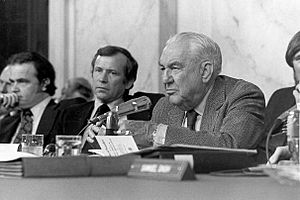
In 1973, Thompson was chosen to help the Republican senators on the Senate Watergate Committee. This committee investigated the Watergate scandal. Thompson is often remembered for a famous question asked by Senator Howard Baker: "What did the President know, and when did he know it?" This question helped guide the investigation. It eventually led to President Richard Nixon leaving office.
On July 13, 1973, a staff member found out about secret White House tapes. Thompson was told about these tapes. He then told Nixon's lawyer, J. Fred Buzhardt. Thompson later wrote that he wanted to make sure the White House knew what would be revealed.
Three days later, during a televised hearing, Thompson publicly revealed the tapes. He asked a former White House aide, Alexander Butterfield, if he knew about listening devices in the Oval Office. National Public Radio called this moment a "turning point" in the investigation.
Some people criticized Thompson for telling the White House about the tapes during the investigation. They said it gave the White House a chance to destroy them. Thompson wrote a book in 1975, At That Point in Time. In it, he criticized a Democratic investigator for leaking information to a newspaper.
Helping Expose Corruption in Tennessee
In 1977, Thompson helped Marie Ragghianti. She was the head of the Tennessee Parole Board. She had been fired for not releasing prisoners who had bribed aides to Governor Ray Blanton. With Thompson's help, Ragghianti sued the governor's office. During the trial, Thompson helped show that there was a "cash-for-clemency" plan. This plan eventually led to Governor Blanton being removed from office.
Working as a Lobbyist
Thompson worked as a lobbyist for some time. Lobbyists try to influence lawmakers on behalf of groups or companies. He earned money from these efforts.
For example, Thompson lobbied Congress for a group of savings and loan companies. He wanted them to pass a law that would reduce rules for their industry. This law was supported by many in Congress and President Ronald Reagan. However, some say it contributed to a later financial crisis.
After Thompson became a Senator, two of his sons also became lobbyists. They tried to avoid working for clients that might cause a conflict of interest with their father's Senate work.
Starting His Acting Career
The story of Marie Ragghianti became a book and then a movie called Marie in 1985. The director, Roger Donaldson, asked Thompson to play himself in the movie. This was Thompson's first acting role.
After that, Donaldson cast Thompson in the 1987 film No Way Out. Thompson often played important figures in government or the military. He was the head of FBI training in Feds (1988). In 1990, he played Ed Trudeau in Die Hard 2 and Rear Admiral Painter in The Hunt for Red October. He also played Big John, the President of NASCAR, in Days of Thunder.
A 1994 New York Times article said that Hollywood directors often chose him when they needed someone to show government power. He played a fictional President of the United States in Last Best Chance. He also played two real presidents: Ulysses S. Grant and Andrew Jackson.
Serving in the United States Senate
Becoming a Senator
In 1994, Thompson was elected to finish the last two years of Al Gore's Senate term. During his campaign, Thompson drove a red pickup truck. He won by a large amount, even though his opponent, Jim Cooper, had been ahead in polls.
On the same night, another Republican, Bill Frist, also won a Senate seat for Tennessee. This was the first time since 1976 that Republicans held both of Tennessee's Senate seats.
In 1996, Thompson was re-elected for a full six-year term. He won with 61% of the votes. This happened even though Bill Clinton and Al Gore won Tennessee in the presidential election that year.
Committee Work
In 1996, Thompson was part of the U.S. Senate Committee on Governmental Affairs. This committee looked into claims that China tried to influence American politics. Thompson said this investigation was difficult because witnesses often refused to testify.
Thompson became the committee chairman in 1997. He also served on the Finance Committee, which deals with health care, trade, and Social Security. He was also on the Intelligence Committee.
During his time in the Senate, Thompson supported changes to how political campaigns are funded. He also worked to prevent the spread of weapons of mass destruction. He wanted the government to be more efficient.
On February 12, 1999, the Senate voted on the impeachment of President Bill Clinton. Thompson voted against convicting Clinton on both charges. To convict, 67 senators must vote yes.
Campaign Co-Chairman for John McCain
In the 2000 Republican Party presidential primaries, Thompson first supported Lamar Alexander. Alexander later became the Senator who took Thompson's place. When Alexander left the race, Thompson supported Senator John McCain. He became McCain's national co-chairman. Both McCain and Thompson were considered as possible running mates for George W. Bush after Bush won the primaries.
His Time in the Senate: How He Was Seen
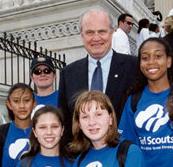
Thompson had a high rating from the American Conservative Union. This group tracks how conservative politicians vote. Senator Susan Collins said Thompson was a "fearless senator." She meant he was not afraid to take a stand, even if it was unpopular.
Some critics said Thompson was "lazy" compared to other senators. They pointed out that few of his ideas became law. Thompson once said he did not like spending long hours voting on unimportant things. However, his former staff members said he spent a lot of time preparing for his work.
Personal Life During His Senate Years
After his first marriage ended, Thompson dated several notable women. In July 1996, he started dating Jeri Kehn. They married on June 29, 2002. They had two children together: a daughter, Hayden, born in 2003, and a son, Samuel, born in 2006.
On January 30, 2002, Thompson's daughter Elizabeth "Betsy" Thompson Panici died from a brain injury. This sad event was a big reason why he decided not to run for re-election.
Life After the Senate
Thompson decided not to run for re-election in 2002. He had said he did not want to make being a Senator his whole career. After the September 11, 2001 attacks, he first thought about running again. But after his daughter's death, he decided to leave the Senate.
After leaving the Senate in 2003, Thompson did some lobbying work for a company called Equitas Ltd. He was paid to help prevent a law that he believed was unfair to them.
Returning to Acting
As Thompson was leaving the Senate, he started acting again. In 2002, he joined the TV show Law & Order. He played a character named District Attorney Arthur Branch. He played this role for five years. He also appeared as this character on other Law & Order shows.
In 2007, Thompson stopped acting again to consider running for president.
Health Update: Cancer Diagnosis
Thompson was diagnosed with non-Hodgkin's lymphoma (NHL), a type of cancer, in 2004. In 2007, he said he had no symptoms from it. He also said his life expectancy should not be affected. He was in remission, meaning the cancer was under control. He said it was treatable with medicine if needed.
Other Activities and Roles
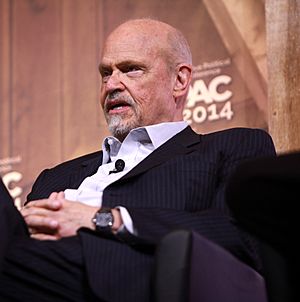
From 2002 to 2005, Thompson led the Federal City Council. This group worked on economic development in Washington, D.C.
In 2003, Thompson appeared in a TV commercial. He supported the invasion of Iraq. He also did voice-over work for the 2004 Republican National Convention.
After Justice Sandra Day O'Connor retired from the Supreme Court in 2005, President George W. Bush asked Thompson to help with the nomination of John Roberts. Roberts later became the Chief Justice.
Until 2007, Thompson chaired the International Security Advisory Board. This group advised the Secretary of State on international security issues.
Helping With a Legal Defense
In 2006, Thompson joined the advisory board for the legal defense fund of I. Lewis "Scooter" Libby Jr.. Libby was accused of lying to federal investigators. Thompson believed Libby was innocent. He even hosted a fundraiser for Libby's defense.
Radio and Columnist Work
In 2006, Thompson became a senior analyst for ABC News Radio. He also filled in for Paul Harvey on the radio. He used this platform to share his political views. He left this role in 2007 when he considered running for president.
Thompson also wrote columns for Townhall magazine from 2007 to 2008.
2008 Presidential Campaign
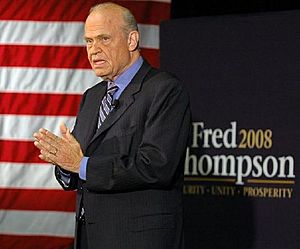
Thompson ran for the Republican nomination in the 2008 United States presidential election. He officially announced his candidacy on September 5, 2007, on The Tonight Show. He also ran a TV ad during a Republican debate.
His campaign entrance was described as "lackluster" by some. In polls towards the end of 2007, Thompson's support was dropping. On January 22, 2008, after not gaining much support in the early primary elections, Thompson announced he was leaving the race. He won 11 delegates in the Republican primaries.
After the Presidential Campaign
More Political Activities
Thompson spoke at the 2008 Republican National Convention on September 2. He talked about John McCain's experiences as a prisoner of war. He also endorsed McCain for president.
Back to Acting
After his presidential campaign, Thompson returned to acting. In 2009, he appeared on the TV show Life on Mars. He also played William Jennings Bryan in the TV movie Alleged. Thompson played Frank Michael Thomas in the CBS series The Good Wife. He also had roles in the movies Secretariat and Sinister. In 2014, he was in the film Persecuted, which focused on religious freedom.
Radio Host Again
On March 2, 2009, Thompson started hosting his own talk radio show, The Fred Thompson Show. His wife, Jeri, sometimes co-hosted with him. His last show aired on January 21, 2011.
Advertising Work
In May 2010, Thompson became a spokesperson for American Advisors Group. This company offers reverse mortgages.
His Memoir
Thompson's memoir, a book about his life, was published in 2010. It was called Teaching the Pig to Dance: A Memoir of Growing up and Second Chances.
His Death
On November 1, 2015, Fred Thompson died at age 73. He died from a return of his lymphoma cancer. His funeral was held on November 6, 2015, in Nashville, Tennessee. He was buried in Mimosa Cemetery in Lawrenceburg, Tennessee.
Fred Thompson's Political Views
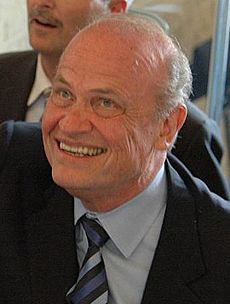
Thompson believed that federalism was very important. This means deciding which level of government (federal, state, or local) should handle different issues.
He stated that the Supreme Court decision Roe v. Wade was wrong. He believed that judges should not make decisions about social policy.
Thompson did not support a federal ban on gay marriage. However, he would have supported a constitutional amendment to prevent one state's recognition of such marriages from affecting other states.
Thompson believed that citizens have the right to keep and bear arms if they do not have criminal records. He voted in favor of gun rights in many votes during his time in the Senate.
Thompson said that U.S. borders should be secure before making big changes to immigration laws. But he also supported a way for illegal immigrants to become citizens. He said it should not be too easy, to be fair to those following the law. Thompson supported the U.S. invasion of Iraq in 2003. He was against taking troops out but felt "mistakes have been made" since the invasion.
Thompson first supported the Bipartisan Campaign Reform Act, which changed campaign finance rules. But he later said that some parts of it should be removed.
Thompson was doubtful that human actions cause global warming. He pointed to similar warming on Mars and other planets as an example.
Film and Television Roles
Thompson's acting roles were usually credited as Fred Dalton Thompson.
Movies
| Year | Title | Role | Notes |
|---|---|---|---|
| 1985 | Marie | Himself | First movie role |
| 1987 | No Way Out | CIA Director Marshall | |
| 1988 | Feds | Bill Bilecki | |
| 1989 | Fat Man and Little Boy | Major General Melrose Hayden Barry | |
| 1990 | The Hunt for Red October | Rear Admiral Joshua Painter | |
| Days of Thunder | Big John | ||
| Die Hard 2 | Ed Trudeau | ||
| 1991 | Flight of the Intruder | JAGC Captain | Uncredited |
| Class Action | Dr. Getchell | ||
| Necessary Roughness | Carver Purcell | ||
| Cape Fear | Tom Broadbent | ||
| Curly Sue | Bernie Oxbar | ||
| 1992 | Aces: Iron Eagle III | Stockman | |
| Thunderheart | William Dawes | ||
| White Sands | Arms dealer | Uncredited | |
| 1993 | Born Yesterday | Sen. Hedges | |
| In the Line of Fire | White House Chief of Staff Harry Sargent | ||
| 1994 | Baby's Day Out | FBI Agent Dale Grissom | |
| 2002 | Download This | Himself | |
| 2005 | Racing Stripes | Sir Trenton | Voice role |
| Looking for Comedy in the Muslim World | Himself | ||
| 2010 | The Genesis Code | Judge Hardin | |
| Secretariat | Arthur "Bull" Hancock | ||
| Ironmen | Governor Neeley | ||
| Alleged | William Jennings Bryan | ||
| 2012 | The Last Ride | O'Keefe | |
| Sinister | Sheriff | ||
| 2013 | Unlimited | Harold Finch | |
| 2014 | Persecuted | Fr. Charles Luther | |
| 23 Blast | Coach Powers | ||
| 2015 | A Larger Life | Robert Parker | |
| 90 Minutes in Heaven | Jay B. Perkins | ||
| 2016 | God's Not Dead 2 | Senior Pastor | Released after his death |
Television Shows
| Year | Series | Role | Episodes |
|---|---|---|---|
| 1988 | Wiseguy | Knox Pooley | 3 episodes |
| Unholy Matrimony | Frank Sweeny | TV movie | |
| 1989 | China Beach | Lt. Col. Reinhardt | 1 episode |
| Roseanne | Keith Faber | 1 episode | |
| Matlock | Gordon Lewis | 2 episodes | |
| In the Heat of the Night | Tommy | 1 episode | |
| 1992 | Bed of Lies | Richard 'Racehorse' Haynes | TV movie |
| Stay the Night | Det. Malone | TV movie | |
| Day-O | Frank DeGeorgio | TV movie | |
| Keep the Change | Otis | TV movie | |
| 1993 | Matlock | Prosecutor McGonigal | 1 episode |
| Barbarians at the Gate | James D. Robinson III | TV movie | |
| 2000 | Sex and the City | Politician on TV | 1 episode |
| 2001 | Rachel and Andrew Jackson: A Love Story | President Andrew Jackson | Voice role, TV movie |
| 2002–2007 | Law & Order | D.A. Arthur Branch | 116 episodes |
| 2003–2006 | Law & Order: Special Victims Unit | D.A. Arthur Branch | 11 episodes |
| 2004 | Evel Knievel | Jay Sarno | TV movie |
| 2005–2006 | Law & Order: Trial by Jury | D.A. Arthur Branch | 13 episodes |
| 2005 | Law & Order: Criminal Intent | D.A. Arthur Branch | 1 episode |
| 2006 | Conviction | D.A. Arthur Branch | 1 episode |
| 2007 | Bury My Heart at Wounded Knee | President Ulysses S. Grant | TV movie |
| 2009 | Life on Mars | NYPD Chief Harry Woolf | 1 episode |
| 2010 | Cars Toons | Big D (voice) | 1 episode |
| 2011–2012 | The Good Wife | Frank Michael Thomas | 2 episodes |
| 2015 | Allegiance | FBI Director | 4 episodes |
Book Written by Fred Thompson
- Thompson, Fred (2010). Teaching the Pig to Dance: A Memoir of Growing Up and Second Chances. Crown Forum. ISBN 978-0-30-746028-8. https://archive.org/details/teachingpigtodan0000thom.
Election Results
| Tennessee United States Senate Election, 1996 | |||||
|---|---|---|---|---|---|
| Party | Candidate | Votes | % | ±% | |
| Republican | Fred Thompson (Incumbent) | 1,091,554 | 61.37% | +0.93% | |
| Democratic | Houston Gordon | 654,937 | 36.82% | ||
| Independent | John Jay Hooker | 14,401 | 0.81% | ||
| Majority | 436,617 | 24.55% | +2.72% | ||
| Republican hold | Swing | ||||
| Tennessee United States Senate Election, 1994 (Special) | |||||
|---|---|---|---|---|---|
| Party | Candidate | Votes | % | ±% | |
| Republican | Fred Thompson | 885,998 | 60.44% | ||
| Democratic | Jim Cooper | 565,930 | 38.61% | ||
| Majority | 320,068 | 21.83% | -16.07% | ||
| Republican gain from Democratic | Swing | ||||
See also
 In Spanish: Fred Thompson para niños
In Spanish: Fred Thompson para niños
- List of United States senators from Tennessee
 | Jessica Watkins |
 | Robert Henry Lawrence Jr. |
 | Mae Jemison |
 | Sian Proctor |
 | Guion Bluford |


